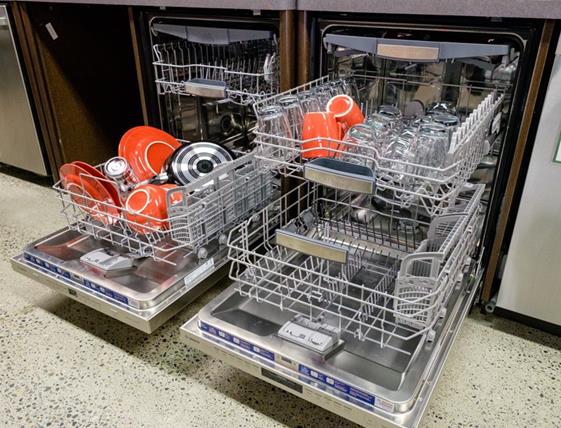There are many practical considerations to be made when it comes to choosing a commercial dishwasher that meets your needs. With the right one, your kitchen will be able to run more smoothly and you can enjoy increased profits, but the wrong one can end up costing you more than you could afford.
Here’s what you need to take into account before making a purchase.
Cost
There are a lucky few in the world who can make purchases without considering costs, but you’re probably not one of them. Whether you’re running a restaurant, cafeteria, coffee shop, or bar, you probably have a strict budget you have to stick to. You have to find the right balance between what you can afford to spend and what you need.
For many smaller establishments, affordable undercounter dishwashers will do the trick. For a cafeteria serving a large hospital, trying to get by with an undercounter model instead of a conveyor one would likely be a disaster. Most restaurants will fall somewhere in between the two extremes and want to shell out for a mid-priced door type dishwasher.
The upfront cost isn’t all you need to think about though. Most restaurant dishwashers will require professional installation. They’ll all use energy and water in significant quantities. You can certainly find models that far better on energy and water use than comparably sized ones if you want to save money over time, but you’ll likely need to spend a bit more upfront.
If you end up with broken glassware because you decide to send it through a traditional commercial dishwasher rather than glasswasher, that’s an additional expense you’ll need to account for as well.
Finally, if your dishwasher is too slow or provides too small of a capacity, then your lost customers could cost you more than the upfront costs of a more expensive model.
Size and Capacity
Before you even start browsing your options, measure your space.
Commercial kitchens are usually busy, crowded places with lots of people in them. In addition to the practical concern of whether the dishwasher will fit, you also need to consider if where you’re placing it will be in the way of the people working in the kitchen. Will it be possible for people to continue doing their jobs in an efficient way with the dishwasher in the allotted spot, taking up the amount of space it will (along with one or more people doing the work to fill it).
How big your commercial dishwasher is will usually directly relate to how many dishes it can hold at a time. As you likely know without being told, this is an extremely important consideration. If your dishwasher can’t wash enough dishes at once, your customers will deal with longer wait times.
Obviously, it can be tricky figuring out how to fit a high-capacity dishwasher into a small, crowded space. You may have to make a trade-off for either more dishes or a more crowded space. Do your best to figure out how to best ensure all meets are met.
Ease of Use
Somebody’s going to be loading and running that dishwasher every day, several times a day. If it’s difficult to figure out or clunky to use, that will become a problem. Manufacturers know how busy commercial kitchens get, so industrial dishwashers are generally designed with efficiency top of mind. Even so, some models will be harder to use if they are placed into a space they’re not well designed for.
Before making a purchase, think through what the process of loading and running it will look like in your kitchen. Try to imagine anything that might end up being difficult on your staff or slow down the process. And consider if there are any features that might add to ease of use, like how well the racks are designed for fast loading and what settings the dishwasher offers.
Speed
Commercial kitchens move fast. Your dishwasher needs to keep up the speed. Capacity is part of this — the more dishes you can fit into one load, the lower the frequency with which you need to run the machine to keep a steady stream of dishes clean. The other main part of the equation is how long a wash cycle lasts.
Most commercial dishwashers are pretty fast. The speed of a cycle is one of the main things that sets undercounter dishwashers apart from their home kitchen counterparts — your home dishwasher probably takes 30-45 minutes, where an undercounter one will finish a cycle within a minute or two. For most kitchens, the difference between a one-minute cycle and a two-minute one probably won’t make that much of a practical difference in how your kitchen runs, but you do want to be aware of how long the dishwasher will take so you’re sure to buy one that’s fast enough.
Temperature
Commercial dishwashers come in high-temperature and low-temperature varieties. High-temperature dishwashers use heat to sanitize dishes, rinsing them at 180° Fahrenheit to ensure they’re fully sanitized. Low-temperature machines can’t get the water that hot, so users instead have to turn to chemicals to make sure the dishes are sanitized.
There’s not a clear consensus on which option is better than the other, although high-temperature industrial dishwashers are more common. High-temperature models cost more upfront and require more energy ongoing, but the dishes dry faster and you don’t have to purchase sanitizing chemicals on a regular basis. Low-temperature models cost less upfront and save you money on energy bills, but you have to consider the cost of buying more chemicals at regular intervals and they tend to damage certain types of dishes, which means you’ll have to purchase new ones more frequently.
Environmentally speaking, high-temperature models are generally considered better in spite of their higher energy use because you won’t be dumping chemicals into the drainage system. And high-temperature models also tend to clean dishes better on the whole.
Noise
Most commercial dishwashers are loud. And the more powerful they are, the louder you can expect them to be. You can find a few smaller undercounter models that are comparably quite quiet, which can come in handy for smaller establishments that need to keep the dishwasher close to where patrons eat and drink. With conveyor and door type dishwashers, you’re going to have to accept some noise.
If you’re concerned about the noise output of the machine you choose, check reviews and product specs to see if decibel ratings are given. In some kitchens, the noise can be accepted as a cost of doing business, but if you’ll be putting the dishwasher in a space where extremely loud noise would be a problem, you should consider the comparison between your different options before making a decision.
Energy and Water Use
You can’t wash dishes without power and water. As with noise, expecting a restaurant dishwasher to add costs to your water and energy bills is simply par for the course. Yet you can absolutely find models designed with energy efficiency in mind. Some come with low-energy settings you can use when appropriate to reduce costs and many are specially designed to use less energy when idling between cycles.
If you’re concerned about the potential energy usage of your commercial dishwasher, look for the Energy Star certification. Machines that earn it have been found to be 40% more energy efficient and use 40% less water.
Electrical and Water Requirements
You need to make sure your kitchen space is prepared for the commercial dishwasher you purchase. Dishwashers use a lot of energy and if your electrical system isn’t designed to offer the proper voltage, you risk blowing a fuse or not being able to use your dishwasher at all.
Check your local codes to make sure you understand the drainage requirements. You can’t just put your dishwasher anywhere, you need to have the right pipes and drains nearby for everything to work and be within code.
If you’re not replacing a similar model, you’ll probably need to call in an electrician and/or plumber to get the space updated for use of a new commercial dishwasher.



